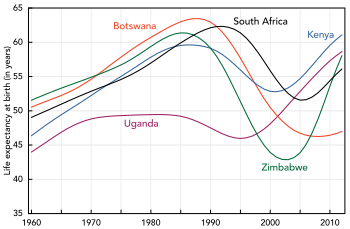
Back Invloed van vigs op die ekonomie Afrikaans أثر فيروس نقص المناعة البشرية والإيدز على الاقتصاد Arabic تأثیر اقتصادی اچآیوی/ایدز Persian HIV/AIDS의 경제적 영향 Korean

HIV/AIDS affects economic growth by reducing the availability of human capital.[1] Without proper prevention, nutrition, health care and medicine that is available in developing countries, large numbers of people are developing AIDS.
People living with HIV/AIDS will not only be unable to work, but will also require significant medical care. The forecast is that this will probably cause a collapse of babies and societies in countries with a significant AIDS population. In some heavily infected areas, the epidemic has left behind many orphans, who are cared for by elderly grandparents.[2]
The increased mortality in this region will result in a smaller skilled population and labor force.[2] This smaller labor force will be predominantly young people, with reduced knowledge and work experience leading to reduced productivity. An increase in workers' time off to look after sick family members or for sick leave will also lower productivity. Increased mortality will also weaken the mechanisms that generate human capital and investment in people, through loss of income and the death of parents.[2] As the epidemic progresses, the age profile of those infected will increase, though the peak is expected to stay within the working age population. HIV disproportionately infects and impacts on women, so those sectors employing large numbers of women e.g. education, may be disproportionately economically impacted by HIV[3]
- ^ Cite error: The named reference
Bell-et-al-2003was invoked but never defined (see the help page). - ^ a b c Greener R (2002). "AIDS a macroeconomic impact". In S, Forsyth (ed.). State of The Art: AIDS and Economics. IAEN. pp. 49–55.
- ^ Risley, Claire L.; Drake, Lesley J.; Bundy, Donald A. P. (November 16, 2012). "Economic Impact of HIV and Antiretroviral Therapy on Education Supply in High Prevalence Regions". PLOS ONE. 7 (11): e42909. Bibcode:2012PLoSO...742909R. doi:10.1371/journal.pone.0042909. PMC 3500246. PMID 23173030.
© MMXXIII Rich X Search. We shall prevail. All rights reserved. Rich X Search